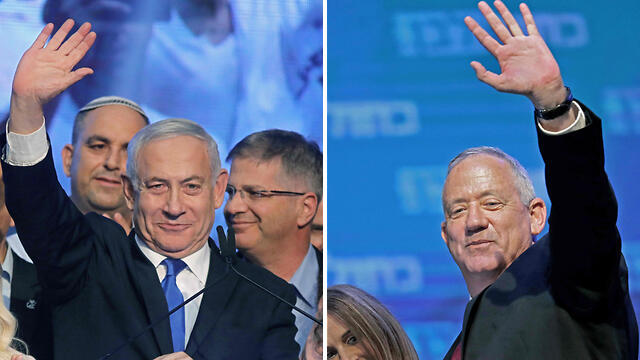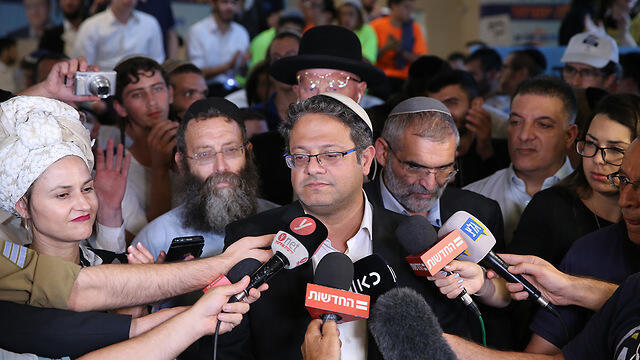Getting your Trinity Audio player ready...
Israel has had four rounds of election since 2013, and it seems that in every one of them, the electronic media (TV and radio mainly) gave a substantial advantage to right-wing, ultra-Orthodox advocates. And as the years have passed, this has become all the more extreme.
and Twitter
A study by the information analysis company 'Ifat' showed that of 2013's 60 most prominent political pundits in the media, those from the right-wing/ultra-Orthodox bloc received over 57% of overall screen time on both radio and TV, while the center-left bloc had no more than 42%.
Prime Minister Benjamin Netanyahu received 873 minutes of screen time, while then-Labor leader Shelly Yachimovich, received just 571 minutes.
These are substantial differences in favor of Netanyahu.
In 2015m, the gap only widened, as favoritism in the media for the right-wing/ultra-Orthodox bloc reached more than 63%, and Netanyahu reigned supreme with a whopping 1,250 minutes of screen time.
Two months before the 2015 elections, while politicians received more or less 8,000 minutes of screen time in total, the leaders of the center-left wing - Tzipi Livni and Isaac Herzog - received just a little over 800 minutes collectively.
The mind-boggling meaning behind these numbers is that one out of every seven minutes of political talk on media belonged to Netanyahu.
In April 2019, not much changed, except there were more media minutes devoted to politics, and substantially more minutes devoted to Netanyahu - 1,474 in fact.
Yet again, 62% of the air time was given to the right-wing/ultra-Orthodox bloc, while the left wing received just 38%. That meant that one out of every six minutes was Netanyahu's.
In the second round of the 2019 elections, due to the general public's fatigue, there was been a drop of about 2,000 minutes devoted to political debate, but fear not, for Netanyahu claimed roughly 900 of those minutes, while Blue and White leader Benny Gantz got less than half of that with 400 minutes.
The unlikely champion of both rounds of the 2019 elections was extreme-right Otzma Yehudit (Jewish Power) leader Itamar Ben-Gvir, who received 612 minutes of combined screen time for both elections and was the third most featured speaker in the most recent round of elections (eighth most featured in the previous round).
Somehow, a man who leads a party that never passed the electoral threshold has more screen time and more coverage than politicians like the Labor Party's Amir Peretz, and Blue and White's Yair Lapid.
It's obvious that the government gets more exposure than the opposition on a daily basis, but when it's election time, the media,, both public and commercial, is expected to compensate for this favoritism. And yet we see that the right-wing and ultra-Orthodox receive considerably more screen time and media coverage.
An argument can be made that Netanyahu's far more frequent appearances are due to Gantz's refusal to appear in the media, but when one looks at last four elections and the various past candidates, some of whom were thrilled to appear anywhere they could (Isaac Herzog, Tzipi Livni, Shelly Yachimovich) it's obvious it's a trend.
4 View gallery


Blue and White leader Benny Gantz during the September 2019 elections
(צילום: יריב כץ)
Additionally, when one takes into consideration the presence of distinct ultra-Orthodox radio stations, even without most appearances made by ultra-Orthodox politicians in the media, the bias is still crystal clear.
It seems things were more adjusted in 2013, but have taken a dramatic nosedive since.
Ifat compared the Likud to its respective opposition in every election since 2013, and it seems there's always a huge gap in screen time in favor of the Likud.
In the most recent elections there were twice as many Likud appearances in the media than Blue and White - the same thing happened in the 2013 elections and to a lesser extent in the 2015 elections.
Whichever way one chooses to look at the given data, one can see an ongoing trend favoring the right-wing/ultra-Orthodox bloc.
Additionally, one can see the rise of media sensations who are given air time again and again. It's obvious the media didn't keep interviewing Itamar Ben-Gvir because of some shared support for Baruch Goldstein (a Jewish terrorist who murdered 29 Muslim worshippers in the Cave of the Patriarchs in Hebron in 1994) but rather because Ben-Gvir is an extremist, and extremists are good for ratings.
4 View gallery


Prime Minister Benjamin Netanyahu addressing his party this week
(באדיבות מפלגת הליכוד)
The result of the latest elections shows just how much the media - who had tried to make amends (and rightfully so) and be more representative of the entire Israeli population - again gave greater exposure to the right-wing.
One cannot separate that the screen time the Likud received during the elections from the power Netanyahu has to assist or harm the media, in both financial and regulatory ways.
According to Ifat, the only central change in the last round of elections was to give Netanya quite a bit more screen time.
In newsrooms a mantra quickly spread of the a need to fix some sort of fundamental perceived imbalance against the prime minister, but as it turns out, this imbalance was actually nonexistent.
There was an assumption that the majority of the people are from the right-wing, but according to the results of the latest elections, that assumption too is inaccurate.
There's no doubt Israeli media needs to be more diverse, for emphasizing the divisions between the right-wing and the left-wing is less important than ensuring that the Arab, minority and ultra-Orthodox populations get their voices heard too.



